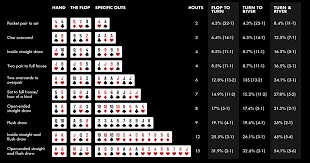
Texas Holdem Flop Odds
When studying flop odds you can see a great deal of information. The odds represent how much you can win if you catch your card.ish your opponents hand. By studying these odds you should be able to guess a good amount of what your next move should be. Bonus-deposit Knowing your opponents is vital to determine what moves they are going to make. If you constantly know what your opponents cards are you can time your next move to try and “read” them.

Take a look at these odds to get a good idea of what information you need to get a good read on your opponents.
Outs
When you have a clear understanding of your opponents you can begin to devise a strategy to win. You should consider several different strategies and evaluate each on your opponent. If you are playing against a player that folds too often you should consider playing fewer hands. If your opponent is very aggressive you shouldn’t stop playing the nuts especially if you are in the blind. There is a very good chance that your opponent will have better cards than you.
Odds
The odds represent the chances of hitting your hand as compared to what cards you need. Many times a player will ask “Should I bet again? Why are they calling?” If you have a good hand there is not always a good reason to continue gambling. There are many draws available to you, especially if you have a good draw. Be selective and make sure you only gamble when you have a very good chance of winning. Don’t be afraid to get out when you have a negative expectation on your hand.
Raising
Most experts suggest that you wait to see the flop if you have a strong hand before you use a raise. There are many reasons for this, but perhaps it is simply because the odds have not yet been detected. If the odds are greater than even, then a raise is probably unnecessary. Some players feel that they have more of a chance at winning with a strong hand, so a raise is a way of telling opponents, “I have a good hand”. A successful bluff, therefore, would not be possible on a later street.
There are a number of different reasons for not levelling a bet. It could be that your hand is terrible, so you are just raising to avoid losing chips. levelling a bet could be seen as weak since you are repositioning yourself to get maximum value for the hand. It is also necessary to take into account the other players at the table. One of the main strategies of poker is to manipulate your opponents. By creating a strong table image you may be able to get certain players to call for you, even with very poor hands.
Never underestimate your hand. High pairs are also good hands to have. When you have more chips behind you, you can play a hand more aggressively. When you have a good hand you also have a better chance of bluffing, which will sometimes work, and sometimes not. However, if you have a great hand, play against your opponent’s hand. When your hand is strong, you can even steal the blinds with appropriate raises. There are few cards in poker that are automatic losses. High pairs are one of them. Another is if you have a good chance of bluffing, even with weak hands, you might want to check your hand. When people think you are weak, they will often back down. bonus-deposit This is especially true in a situation where you have a strong hand (a high pair, for example) and people call you bet or raise you sightly because they think they can easily beat you. Then, when you actually have a strong hand, obviously do not bet heavily. What you want to do with a strong hand is simply to use your chips as leverage against your opponents. There is no need to get overly aggressive with a strong hand. When you have a strong hand, play it out. Playing it out slowly is a way to build people up to the point where they will be more susceptible to your bluffs. If people start calling your bluffs then know that their hands are probably weaker than you think.
Not playing aggressively with a strong hand probably means that you are in some trouble with this hand. This is one of those occasions where being patient pays off. Wait for a better spot or save your chips for another hand.
Taking chances on drawing hands
When you have a good drawing hand, you should be aggressive with your chip stack. This is especially true if your opponent is short stacked. Remember, the more chips that you throw in the pot, the more chances you have of getting paid off. Always be flexible with your calling strategy.